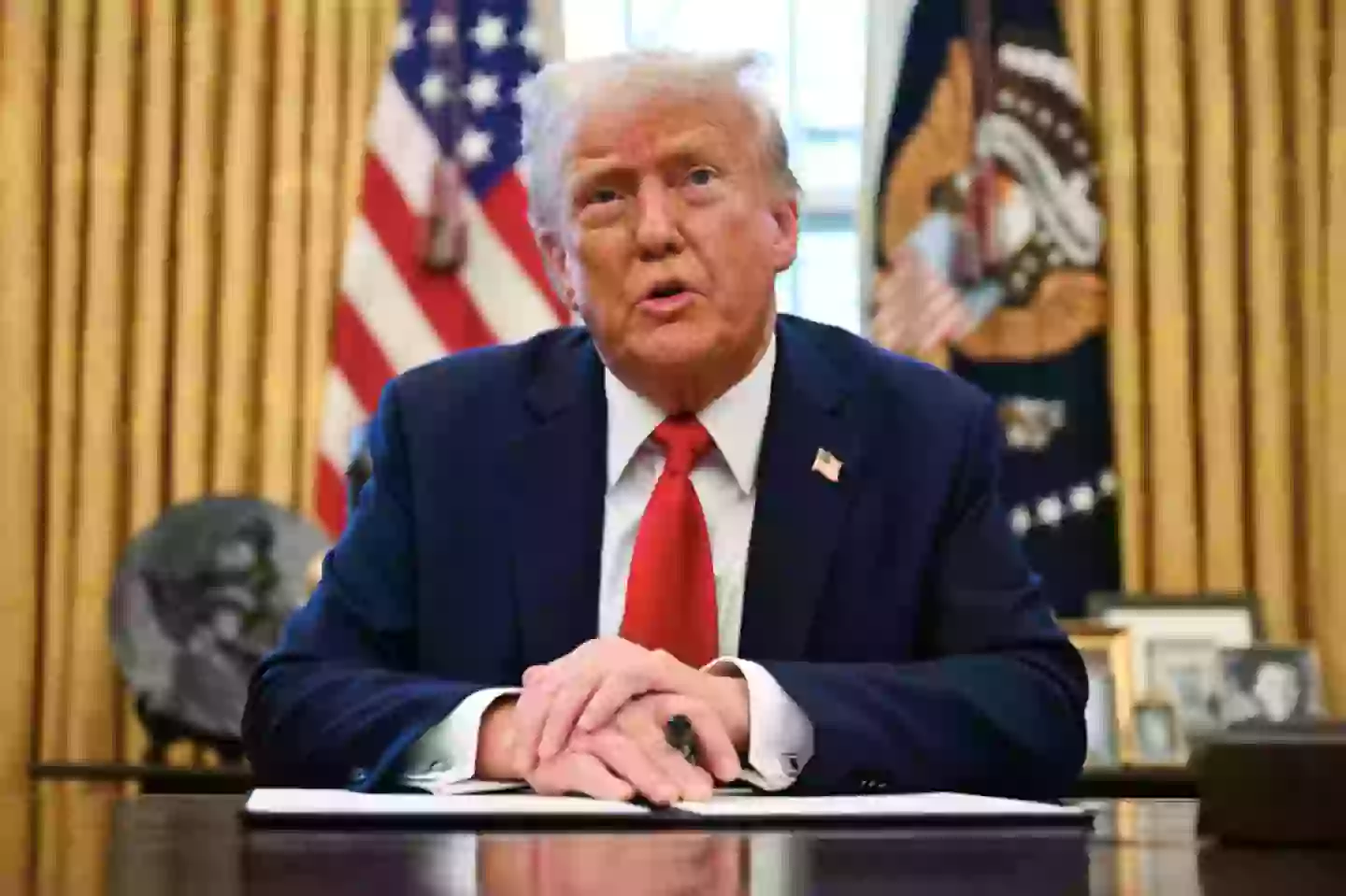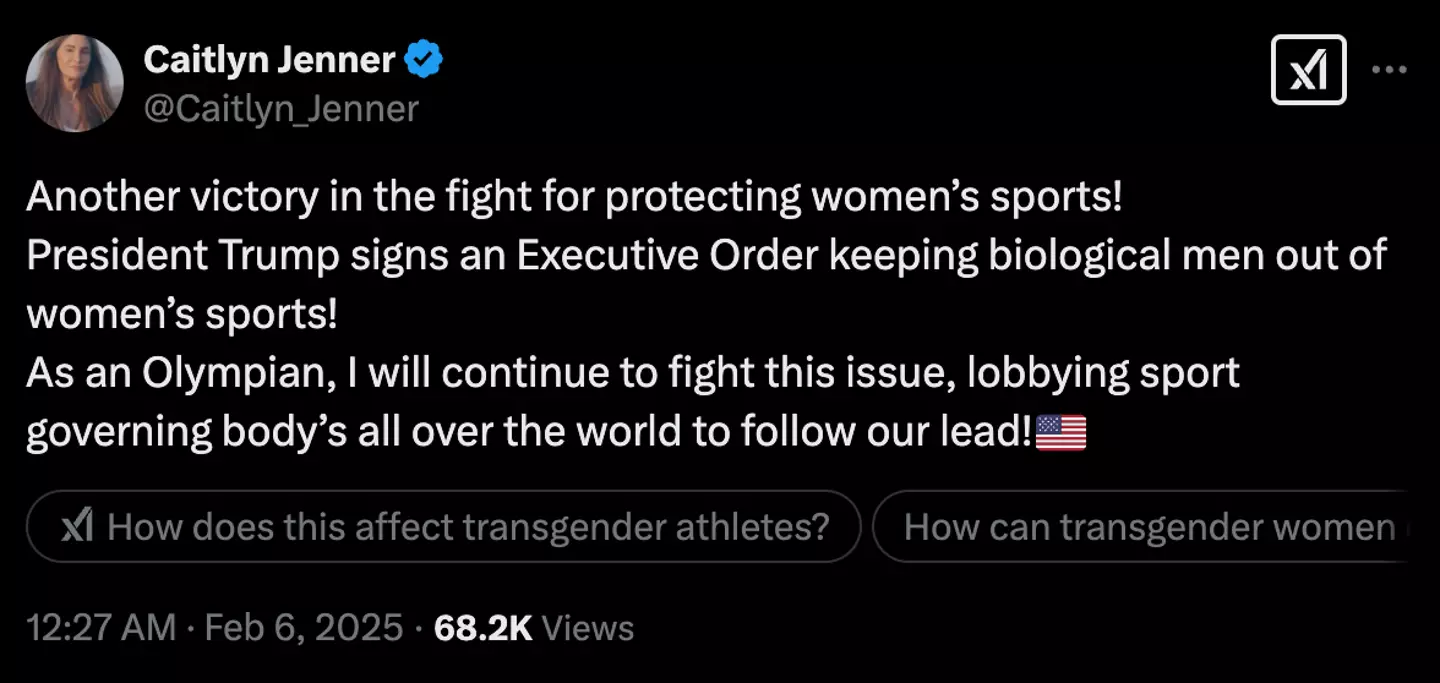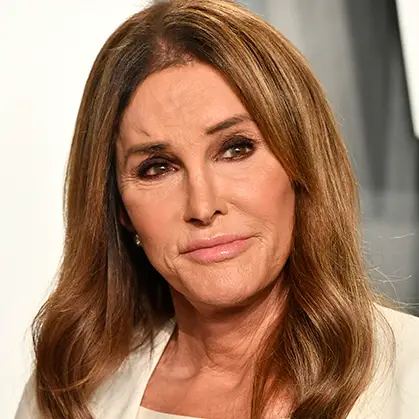Caitlyn Jenner’s Unexpected Support for Trump’s Latest Executive Order Sparks Debate
In a surprising reversal of her previous criticisms, Caitlyn Jenner has publicly endorsed former President Donald Trump’s newest executive order targeting transgender rights—a policy move that has shocked many and ignited intense online debate. This latest order, which aims to restrict transgender women from competing in girls’ and women’s sports by denying federal funds to non-compliant schools, represents a dramatic departure from previous initiatives and has prompted a flurry of reactions from across the political spectrum.
Trump’s Executive Order: A Closer Look
On February 5, 2025, Donald Trump signed an executive order that seeks to redefine the participation rules for transgender athletes in educational institutions receiving federal funding. The order specifically targets transgender women, barring them from competing on girls’ and women’s sports teams. To enforce this change, the policy directs the Education Department to inform schools that allowing transgender athletes to participate in female sports constitutes a violation of federal sex discrimination laws, specifically Title IX. Under current law, any school that discriminates based on sex risks losing federal funds—a threat that Trump has used to frame this initiative as a necessary measure to protect female athletes.

Speaking from the White House, Trump stated,
“We will defend the proud tradition of female athletes. From now on, women’s sports will be only for women. The war on women’s sports is over.”
He further claimed that this order is part of a “sweeping effort to reclaim our culture and our laws.” According to Trump, any school that permits transgender women to participate in female sports, or that allows them access to facilities such as locker rooms, will face investigations and potential loss of federal funding. This move comes amid a series of executive actions since Trump assumed office for his second term, with previous orders that have sought to enforce a strict binary definition of gender.
In his earlier policies, Trump has explicitly stated that the United States government should only recognize two genders. One policy directive asserted,
“Agencies will cease pretending that men can be women and women can be men when enforcing laws that protect against sex discrimination. These sexes are not changeable and are grounded in fundamental and incontrovertible reality.”
This language, along with other actions such as revoking protections under the Equal Employment Opportunity Act and halting funding for gender transitions for minors, has drawn sharp criticism from civil rights advocates and members of the LGBTQ+ community.
The Biological Definition Controversy
One of the most contentious aspects of the executive order lies in its definition of “male” and “female.” The policy claims that a person is defined as female if, at conception, they belong to the sex that produces the large reproductive cell, and male if they belong to the sex that produces the small reproductive cell. Critics argue that this definition is scientifically flawed. Ash Lazarus Orr, press relations manager at Advocates for Trans Equality, explained,
“It’s especially egregious that this order defines ‘sex’ as starting ‘at conception,’ which is impossible. While it’s possible to know chromosomal information, human embryos don’t show sexual differentiation at that stage—all embryos initially develop along ‘female’ lines until later in development.”
This definition, and the rigid binary it imposes, is seen by many experts as an oversimplification that fails to account for the complexities of human biology and gender diversity. The policy’s reliance on such a narrow interpretation of sex has raised alarms among advocates, who warn that it could lead to widespread discrimination against transgender, non-binary, intersex, and two-spirit individuals.
Caitlyn Jenner’s Surprising Endorsement
In an unexpected twist, Caitlyn Jenner—an influential figure in the transgender community and a former Olympic athlete—took to Twitter (now known as X) to issue a statement in support of Trump’s new order. Jenner’s remarks represent a marked departure from her previous public criticisms of Trump’s policies toward transgender individuals.
On X, Jenner tweeted:
“Another victory in the fight for protecting women’s sports! President Trump signs an Executive Order keeping biological men out of women’s sports!”
She went on to add,
“As an Olympian, I will continue to fight this issue, lobbying sport governing bodies all over the world to follow our lead!”
This supportive message has left many in the online community both shocked and confused, given Jenner’s past stances. Previously, she had been vocal in her disapproval of Trump’s treatment of the transgender community. In a 2018 Washington Post column, Jenner admitted that her earlier support for Trump was a mistake, criticizing him for what she described as using the transgender community as “political pawns.” At that time, she expressed disappointment over Trump’s policies, including the overturning of guidance that allowed transgender students to use school facilities matching their gender identity.

Furthermore, during an interview with the BBC, Jenner had stated,
“It doesn’t make me regret my vote yet, but it is very disappointing and I have been very vocal about that. I thought Trump would be better on these issues.”
Her current statement, therefore, is seen as a major U-turn that has surprised many observers and sparked intense debate. Critics question whether Jenner’s new position represents a genuine shift in her views or if it is a calculated political move in response to evolving dynamics within the transgender community and the broader political landscape.
Political and Social Reactions
The online reaction to Caitlyn Jenner’s endorsement of Trump’s order has been swift and polarized. Supporters of the executive order have lauded Jenner’s statement as a bold affirmation of what they consider necessary measures to protect the integrity of women’s sports. They argue that transgender women competing in female sports categories could undermine the fairness of competition—a claim that forms the crux of Trump’s rationale behind the order.
Conversely, many in the LGBTQ+ community and progressive circles have expressed shock and dismay. Critics argue that Jenner’s reversal undermines decades of advocacy for transgender rights, highlighting the potential consequences of aligning with policies that restrict the rights of marginalized groups. They contend that the executive order, along with Jenner’s endorsement, represents a significant step backward in the fight for equality and inclusion.
Political analysts note that Jenner’s statement is likely to have far-reaching implications. As a public figure with millions of followers, her endorsement carries weight and may influence public opinion, particularly among those who are already on the fence about issues of transgender rights. The controversy has reignited debates over how gender is defined in legal and social contexts, as well as the role of government in regulating athletic competition and protecting individual rights.
The Broader Implications for Transgender Rights
Trump’s executive order, along with the policies it embodies, represents one of the most significant challenges to transgender rights in recent years. By seeking to enforce a strict binary definition of gender, the order effectively erases the recognition of transgender, non-binary, and other gender-diverse individuals within federal law. This approach not only limits access to basic rights and protections but also reinforces harmful stereotypes that contribute to ongoing discrimination.
Legal experts predict that the order will face numerous challenges in court. The reliance on a narrow, biologically deterministic definition of gender is likely to be contested by advocates who argue that it is both scientifically inaccurate and constitutionally problematic. Furthermore, by threatening to withhold federal funding from schools that allow transgender athletes to compete, the policy could set a dangerous precedent, impacting a wide range of educational institutions and potentially affecting other federally funded programs designed to promote diversity and inclusion.
Advocates for transgender rights have mobilized quickly in response to the order, calling on legislators, civil rights groups, and the broader public to resist what they view as an attack on a vulnerable community. Public protests, social media campaigns, and legal challenges are expected to intensify in the coming months as various stakeholders seek to overturn or amend the policy.
Trump’s Track Record on Transgender Issues
The current executive order is part of a broader pattern in Trump’s approach to transgender issues. Since assuming office for his second term, Trump has issued several executive orders and policy directives aimed at redefining gender within the framework of federal law. These measures include attempts to limit the recognition of transgender identities to a strict male-female binary and to curtail funding for programs that support gender transition, particularly for minors.
Critics have long argued that Trump’s policies have marginalized transgender individuals by framing their existence as a political or cultural threat. The revocation of protections under the Equal Employment Opportunity Act and the curtailing of support for gender-affirming healthcare have been particularly contentious. By extending these policies to the realm of athletic competition, Trump’s latest order reinforces the administration’s broader agenda of challenging what it perceives as “gender ideology.”
This history of actions has fostered a deep sense of disillusionment among many in the transgender community. For those who have struggled with the societal and institutional barriers to recognition and acceptance, each new policy represents yet another setback in the fight for equality. Against this backdrop, Caitlyn Jenner’s reversal—from once criticizing Trump’s approach to now endorsing his latest order—has been met with significant controversy. Many wonder if her support signals a genuine change in perspective or a pragmatic shift in strategy amid evolving political currents.
The Role of Social Media and Celebrity Influence
The public debate surrounding Trump’s executive order and Caitlyn Jenner’s statement highlights the powerful role that social media plays in modern political discourse. With millions of users engaging on platforms like X (formerly Twitter) and Instagram, the exchange of ideas—and the polarization of opinions—occurs at an unprecedented scale. Jenner’s tweet, which quickly went viral, has become a focal point for discussions on transgender rights, government policy, and the responsibilities of public figures.
Celebrity endorsements and reversals have long been a potent force in shaping public opinion. In this instance, Jenner’s unexpected support for Trump’s order has not only shocked her followers but has also sparked a broader conversation about the intersections of celebrity, politics, and social justice. Her influence is significant; as a former Olympian and a transgender woman, her voice carries weight in debates over issues that affect millions of people. Whether her statement will ultimately sway public sentiment or simply add another layer of complexity to an already contentious issue remains to be seen.
Looking Ahead: The Future of Transgender Rights and Government Policy
As the legal and political battles over transgender rights continue to unfold, the future remains uncertain. Trump’s executive order is poised to face intense scrutiny in the courts, and the outcome of these challenges could have far-reaching implications for the recognition and protection of transgender individuals in the United States. Legal experts, civil rights advocates, and policymakers are all watching closely, aware that the stakes extend far beyond athletic competition—they touch on the fundamental question of who gets to be recognized as a full, equal member of society.
Moreover, the controversy surrounding Caitlyn Jenner’s statement is likely to have lasting effects on the discourse around transgender rights. Her unexpected endorsement has raised important questions about the evolution of public opinion within the transgender community and the role of personal experience in shaping political beliefs. As more voices join the debate, it is clear that the struggle for transgender equality is far from over. The coming months will likely see continued activism, legal challenges, and public discussions aimed at ensuring that policies reflect the realities of a diverse and dynamic society.
The discussion also serves as a reminder that the conversation about gender is complex and multifaceted. While some advocate for a strict, binary interpretation of gender, others call for a more nuanced understanding that reflects the full spectrum of human experience. This debate is not merely academic—it has real-world implications for the lives of millions of people, influencing everything from healthcare and education to employment and legal rights.
Conclusion
The recent exchange between Transportation Secretary Sean Duffy, Hillary Clinton, and the surprising endorsement by Caitlyn Jenner encapsulates a critical moment in the ongoing debate over transgender rights in the United States. Trump’s executive order—designed to restrict transgender women from participating in girls’ and women’s sports—has reignited fierce debates about the definition of gender, the role of government in regulating personal identity, and the balance between tradition and progress.
Caitlyn Jenner’s reversal of her previous stance and her vocal support for the order have shocked the internet and sparked intense discussions among supporters and critics alike. Her comments, juxtaposed with Trump’s long-standing efforts to enforce a binary interpretation of gender, underscore the deep divisions that persist in our society regarding issues of identity and inclusion.
As legal challenges loom and public debate intensifies, the future of transgender rights remains uncertain. Yet, the power of open dialogue and the influence of high-profile figures like Jenner ensure that the conversation will continue—pushing us to confront our biases, question long-held assumptions, and ultimately, strive for a society where every individual is recognized and respected for who they truly are.
In this critical juncture, the voices of those affected by these policies must be heard. As advocates, policymakers, and citizens work to chart a path forward, it is essential to balance the need for safety and tradition with the imperative of inclusion and equality. The coming months promise to be a defining period in the evolution of government policy on transgender rights, and the outcomes will undoubtedly shape the cultural landscape for years to come.
Stay tuned as we continue to monitor developments in this unfolding story—a narrative that touches on the very core of who we are as a society and the values we choose to uphold in the face of change.

